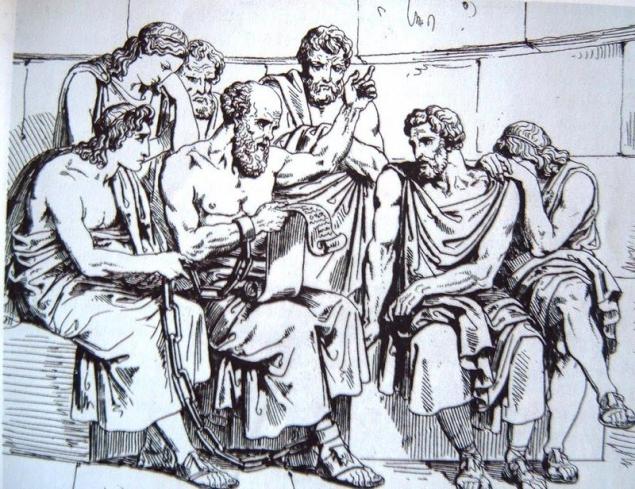576
The wisdom of the ages: 5 rituals that will make you happier
People have deep respect for the sages of antiquity. But for some reason do not read their works. Interesting fact: if you choose books in the section "classic" and not on the shelves for self-development, your chances of living a happy life grow significantly. As for happiness, we have enough ideas, well-known for thousands of years.

1. We are not upset by events, and beliefs
Imagine you left a loved one. Are you sad? The world will never be the same again?
Now imagine the same scenario, but in the end you learn that this man is a psychopath who killed three of his past partners. You're upset that you left? No, you are frightened!
It becomes clear that the mere fact of separation is not as important as your view of the situation.
If you lose your job and are confident that it was a bad job and find a new place won't take much time, you don't worry. If you are convinced that it was the best job and another you never find what you're devastated.
Our emotions are not random, they come from our thoughts.
"The doctrine of the Stoics show that there are no bad or good events, only our perception of what is happening. Shakespeare made it this way: "There is nothing either good or bad but thinking makes it so". And Shakespeare, and ancient philosophers have assured us that the world is indifferent and objective. As the Stoics say: "It happened to me" and "It happened to me, and it's awful" is not the same. If you focus only on the first part, you will be more resilient and will be able to make something good out of all that would be with you no matter what."
The doctrine of the school of stoicism was adapted by the famous psychologist albert Ellis and influenced the formation of rational-emotive behavioral therapy — primary method that helps to overcome a range of serious problems, from depression to uncontrollable rage.
Most of the experiences caused by our irrational beliefs.
Next time, when faced with a negative emotion, don't focus on the event that caused. Ask yourself how your thoughts are rational:
If my partner left me, I will never recover from this.
If I lose my job, my life is over.
If I don't read to the end of this post, the author will hate me.
These judgments are irrational, and they provoke anxiety, anger or depression.
Change your thinking and you will be able to cope with the emotions: "Even if he/she will leave me, I'll meet someone else. This has happened before and I coped".
But what to do if you are worried about the future?
2. Control what you can and ignore the rest
You know the Prayer of Serenity? (Its author is Reinhold Niebuhr, the American theologian, who lived at the turn of XIX-XX centuries):
"God, grant me the ability to accept the things I cannot change,
The courage to change the things I can control,
And the wisdom to distinguish one from the other."
Reinhold Niebuhr came to this thought in the thirties of the last century. The Stoics preached this simple idea 2000 years ago. The philosophers of antiquity paid much attention to the control, but still was not obsessed with it. The key idea of stoicism: "Can I affect this?"
If Yes, do it. If you can't... mean that you can't. Experiences do not lead to anything but stress.
"According to the teachings of stoicism, often what bothers us is something we have no control. For example, I have scheduled for tomorrow the important thing, and I'm worried about the rain. No matter how much I'd be nervous. Rain will not stop. The Stoics say: "not only will You be happier if you learn to distinguish between situations in which can and cannot influence what is happening, but will become more productive and efficient if they focus their energy entirely on what you have control".
Next time you worry about what is happening, stop for a second and ask yourself: "Can I influence events?" If Yes, then stop worrying and take the job. If you are not able to control the situation, worry will not improve the situation.
Sadness, anger, anxiety is an irrational response, and not the best way to react.
How, then, to refer to events that go wrong?

3. Take everything, but don't be passive
This item is more problems. Nobody likes the word "take". For many, it means to accept and surrender. But it's not.
Let's look at it this way. What is the antonym of the word "accept"? To deny. No one ever recommends to deny what is happening.
Albert Ellis advised people to exclude from his speech word "should". "Should" — is a denial. Whatever you want, your expectations will not prevail over reality.
You accept the fact that it is raining. Denial and "needs" nothing will change... But that doesn't mean you can't take an umbrella.
"In our understanding of the adoption — the synonym of humility, but for the Stoics this meant taking the facts as they are, and then decide what to do with them. The problem is that because of our expectations, we perceive the adoption as submission to circumstances, whereas in reality we have no idea what might happen. As the Stoics say: "Let's not waste energy in search of what is beyond our control, it is better to accept these facts, move on and see what I can do."
The next time things don't go as planned, don't deny it, accept it. Ask whether you can affect what is happening? If Yes, do something. If not, ask yourself whether your rational beliefs.
So you go from "Not supposed to be rain! Now we can't go to the Park! The whole day is ruined!" to "it's raining, so no trip to the Park. Then let's see a good movie!"
So, we have discussed the teaching of stoicism on how to cope with negative emotions. Is our defence. Now let's talk about the attack — about how to improve the situation.
4. Decide whose child you will be
I know, I know, sounds pointless. Give me a minute, I'll explain it.
All of what we said earlier, happens in the mind. And as we have seen, it is out of my head come almost all of our problems. But if we want to improve the situation, it is necessary to learn from other people.
You are not alone in this world. So many things you can learn from other people: role models, mentors. Seneca, one of the pillars of stoicism, expressed this idea in a beautiful saying which I love:
"We like to say that you can't choose the parents that they are defined to us by chance, however, we really has the power to choose whose son want to be."
When I spoke with Professor Anders Ericsson, author of the theory of 10 000 hours of practice that can make anyone an expert, he said, if you want to become better in any field, the first step is to find a mentor.
Anders: "you Need to talk to someone whom you admire, something that performs at a level which you would like to achieve.The presence of such a mentor will help you understand what may need to be changed to achieve the desired skill level. Ask that person how he reached his ask to help you identify what is stopping you at the moment to achieve a desired result, and what are the next steps toward the goal."
The next time you face an obstacle, think of someone whom you admire. Studies show that the question "What would ________ have done in my place?" can have a strong positive influence on your behavior.
Role models and mentors, which helps to achieve the best version of yourself. However, make sure that you really enjoyed? How do you know that you are progressing on your chosen path?
5. Morning and evening rituals have a significant impact
A huge number of studies confirm that rituals can greatly enhance our life. What kind of rituals recommended by the Stoics?
Morning and evening rituals. One is to help you prepare for this day, and the other is to evaluate the way this day, and that can be corrected in the future.
"Stoicism teaches us to start the day with a ritual that resembles what we face. Marcus Aurelius said: "Today the people you will meet, will be..." and then he listed all the negative traits that could meet during the day. It's not pessimistic, he said: "Now that you already know all this, will not take everything personally, and don't try to understand why a person behaves this way, forgive and love them despite it."The Stoics believed that it is necessary to start the day with meditation, preparing himself for the future, and to finish thinking about what had happened and what I can fix."
The Stoics did not believe in perfection. They perceive that we are all in a constant process of work. You can always become better. In the words of Seneca: "as long as you live, keep learning to live."
To summarize:
Five points, as the wisdom of the ancient philosophers can help you be happier:
The stoic philosophers paid much attention to gratitude. In the "Meditations" Marcus Aurelius wrote, "do Not to focus on things that you don't belong, as if they were your own. But consider the blessings that really belong to you, and think about how badly you wished them, if they were yours."
Thousands of years later scientists would support him in this belief. Studies show that imagining life without the cherished moments, more people are starting to appreciate what happened to them. It makes us more grateful and happy.
"What if I never would have met her companion/MC life? Had I not had children? I'm so happy they are in my life."
You don't need all those shiny trinkets to be happy. Stop for a second to realize the value of great things you already possess.
We usually overestimate the novelty. Sometimes the idea that for thousands of years is all that is required for happiness. published
Author: Eric Barker, the translation Lera Petrosyan
P. S. And remember, just changing your mind - together we change the world! ©
Source: interesno.co/myself/b834e9ca72b4

1. We are not upset by events, and beliefs
Imagine you left a loved one. Are you sad? The world will never be the same again?
Now imagine the same scenario, but in the end you learn that this man is a psychopath who killed three of his past partners. You're upset that you left? No, you are frightened!
It becomes clear that the mere fact of separation is not as important as your view of the situation.
If you lose your job and are confident that it was a bad job and find a new place won't take much time, you don't worry. If you are convinced that it was the best job and another you never find what you're devastated.
Our emotions are not random, they come from our thoughts.
"The doctrine of the Stoics show that there are no bad or good events, only our perception of what is happening. Shakespeare made it this way: "There is nothing either good or bad but thinking makes it so". And Shakespeare, and ancient philosophers have assured us that the world is indifferent and objective. As the Stoics say: "It happened to me" and "It happened to me, and it's awful" is not the same. If you focus only on the first part, you will be more resilient and will be able to make something good out of all that would be with you no matter what."
The doctrine of the school of stoicism was adapted by the famous psychologist albert Ellis and influenced the formation of rational-emotive behavioral therapy — primary method that helps to overcome a range of serious problems, from depression to uncontrollable rage.
Most of the experiences caused by our irrational beliefs.
Next time, when faced with a negative emotion, don't focus on the event that caused. Ask yourself how your thoughts are rational:
If my partner left me, I will never recover from this.
If I lose my job, my life is over.
If I don't read to the end of this post, the author will hate me.
These judgments are irrational, and they provoke anxiety, anger or depression.
Change your thinking and you will be able to cope with the emotions: "Even if he/she will leave me, I'll meet someone else. This has happened before and I coped".
But what to do if you are worried about the future?
2. Control what you can and ignore the rest
You know the Prayer of Serenity? (Its author is Reinhold Niebuhr, the American theologian, who lived at the turn of XIX-XX centuries):
"God, grant me the ability to accept the things I cannot change,
The courage to change the things I can control,
And the wisdom to distinguish one from the other."
Reinhold Niebuhr came to this thought in the thirties of the last century. The Stoics preached this simple idea 2000 years ago. The philosophers of antiquity paid much attention to the control, but still was not obsessed with it. The key idea of stoicism: "Can I affect this?"
If Yes, do it. If you can't... mean that you can't. Experiences do not lead to anything but stress.
"According to the teachings of stoicism, often what bothers us is something we have no control. For example, I have scheduled for tomorrow the important thing, and I'm worried about the rain. No matter how much I'd be nervous. Rain will not stop. The Stoics say: "not only will You be happier if you learn to distinguish between situations in which can and cannot influence what is happening, but will become more productive and efficient if they focus their energy entirely on what you have control".
Next time you worry about what is happening, stop for a second and ask yourself: "Can I influence events?" If Yes, then stop worrying and take the job. If you are not able to control the situation, worry will not improve the situation.
Sadness, anger, anxiety is an irrational response, and not the best way to react.
How, then, to refer to events that go wrong?

3. Take everything, but don't be passive
This item is more problems. Nobody likes the word "take". For many, it means to accept and surrender. But it's not.
Let's look at it this way. What is the antonym of the word "accept"? To deny. No one ever recommends to deny what is happening.
Albert Ellis advised people to exclude from his speech word "should". "Should" — is a denial. Whatever you want, your expectations will not prevail over reality.
- My children need to behave. (But they don't do that)
- The road must not be so loaded. (But we've been standing for an hour in traffic)
- The rain wasn't supposed to go. (But it's pouring outside)
You accept the fact that it is raining. Denial and "needs" nothing will change... But that doesn't mean you can't take an umbrella.
"In our understanding of the adoption — the synonym of humility, but for the Stoics this meant taking the facts as they are, and then decide what to do with them. The problem is that because of our expectations, we perceive the adoption as submission to circumstances, whereas in reality we have no idea what might happen. As the Stoics say: "Let's not waste energy in search of what is beyond our control, it is better to accept these facts, move on and see what I can do."
The next time things don't go as planned, don't deny it, accept it. Ask whether you can affect what is happening? If Yes, do something. If not, ask yourself whether your rational beliefs.
So you go from "Not supposed to be rain! Now we can't go to the Park! The whole day is ruined!" to "it's raining, so no trip to the Park. Then let's see a good movie!"
So, we have discussed the teaching of stoicism on how to cope with negative emotions. Is our defence. Now let's talk about the attack — about how to improve the situation.
4. Decide whose child you will be
I know, I know, sounds pointless. Give me a minute, I'll explain it.
All of what we said earlier, happens in the mind. And as we have seen, it is out of my head come almost all of our problems. But if we want to improve the situation, it is necessary to learn from other people.
You are not alone in this world. So many things you can learn from other people: role models, mentors. Seneca, one of the pillars of stoicism, expressed this idea in a beautiful saying which I love:
"We like to say that you can't choose the parents that they are defined to us by chance, however, we really has the power to choose whose son want to be."
When I spoke with Professor Anders Ericsson, author of the theory of 10 000 hours of practice that can make anyone an expert, he said, if you want to become better in any field, the first step is to find a mentor.
Anders: "you Need to talk to someone whom you admire, something that performs at a level which you would like to achieve.The presence of such a mentor will help you understand what may need to be changed to achieve the desired skill level. Ask that person how he reached his ask to help you identify what is stopping you at the moment to achieve a desired result, and what are the next steps toward the goal."
The next time you face an obstacle, think of someone whom you admire. Studies show that the question "What would ________ have done in my place?" can have a strong positive influence on your behavior.
Role models and mentors, which helps to achieve the best version of yourself. However, make sure that you really enjoyed? How do you know that you are progressing on your chosen path?
5. Morning and evening rituals have a significant impact
A huge number of studies confirm that rituals can greatly enhance our life. What kind of rituals recommended by the Stoics?
Morning and evening rituals. One is to help you prepare for this day, and the other is to evaluate the way this day, and that can be corrected in the future.
"Stoicism teaches us to start the day with a ritual that resembles what we face. Marcus Aurelius said: "Today the people you will meet, will be..." and then he listed all the negative traits that could meet during the day. It's not pessimistic, he said: "Now that you already know all this, will not take everything personally, and don't try to understand why a person behaves this way, forgive and love them despite it."The Stoics believed that it is necessary to start the day with meditation, preparing himself for the future, and to finish thinking about what had happened and what I can fix."
The Stoics did not believe in perfection. They perceive that we are all in a constant process of work. You can always become better. In the words of Seneca: "as long as you live, keep learning to live."
To summarize:
Five points, as the wisdom of the ancient philosophers can help you be happier:
- We are not upset by events, and beliefs: only the end of the world really means the end of the world.
- Control what you can and ignore the rest: worry has never fixed the situation.
- Take everything, but don't be passive: no one suggests denial. Take. And then proceed.
- Decide whose baby it is you: What Batman would do in this situation?
- Morning and evening rituals have a significant influence: plan the day, and then summarize.
The stoic philosophers paid much attention to gratitude. In the "Meditations" Marcus Aurelius wrote, "do Not to focus on things that you don't belong, as if they were your own. But consider the blessings that really belong to you, and think about how badly you wished them, if they were yours."
Thousands of years later scientists would support him in this belief. Studies show that imagining life without the cherished moments, more people are starting to appreciate what happened to them. It makes us more grateful and happy.
"What if I never would have met her companion/MC life? Had I not had children? I'm so happy they are in my life."
You don't need all those shiny trinkets to be happy. Stop for a second to realize the value of great things you already possess.
We usually overestimate the novelty. Sometimes the idea that for thousands of years is all that is required for happiness. published
Author: Eric Barker, the translation Lera Petrosyan
P. S. And remember, just changing your mind - together we change the world! ©
Source: interesno.co/myself/b834e9ca72b4
How a Family Scenario Affects Your Personal Life
Delicious intimacy: keep the balance between Give and Take






















